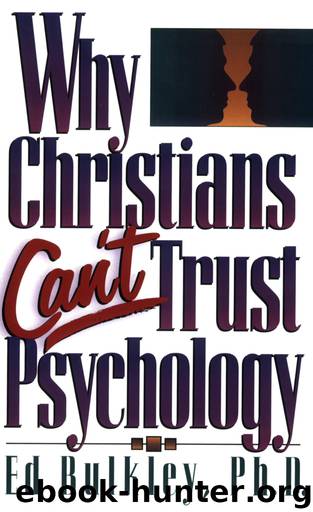Why Christians Can't Trust Psychology by Bulkley Ed

Author:Bulkley, Ed [Bulkley, Ed]
Language: eng
Format: epub
Publisher: Harvest House Publishers
Published: 1993-06-30T16:00:00+00:00
Humanist Observer
Whether psychology has caught up to religion, infiltrated it, or been adopted by it, the most popular versions of both psychology and religion are becoming less and less distinguishable.
The Biblical Counselor
How ironic it is that a self-avowed secular humanist is able to see the effects of integration when many Christians cannot!
The Word of God
A little yeast works through the whole batch of dough.
—Galatians 5:9
CHAPTER
9
Psychology and the Church
Psychology is displacing the role of the church in modern Christianity. I do not believe that this is the conscious purpose of most Christian psychotherapists, but nonetheless it is happening. One of the foremost tools accomplishing this is the integration of secular psychological concepts into Christian counseling.
An apologist for this concept defines integration as “a recognition of the ultimate authority of the Bible, a willingness to learn what God has allowed humans to discover through psychology and other fields of knowledge, and a desire to determine how both scriptural truths and psychological data can enable us better to understand and help people.” 1
He says that integration is not “the same as a merger” and that “integration makes no attempt to elevate psychology to the level of the Word of God.” 2 The author quotes Kirk E. Farnsworth’s statement from Whole-Hearted Integration: “[Integration refers to] the uniting, but not fusing, of psychology and theology. Integration is the process whereby both disciplines retain their own identity while benefiting from each other’s perspective and communicating the same truth.” 3
Let’s see why it is impossible to integrate psychology into biblical counseling without seriously displacing the ministry of the church.
Overlap of Psychology and Theology
One psychotherapist has suggested that psychology and theology are basically the same discipline:
Some of us think that psychology and theology a re. . . independent and uncorrelated. If this is true, there cannot be a Christian psychology any more than there can be a Christian geology or physics. Others of us assume that insofar as the subject matter and intention of the two disciplines overlap, psychology and theology can be thought of as essentially the same discipline. With this in mind, some people are hoping to develop a single, unified, conceptual-theoretical system combining data and ideas from both branches of knowledge. 4
The main problem, according to this psychotherapist, is that “some theologians [see things] in terms of ultimate truths, [and] ‘ultimate truths’ are foreign to psychology and tend to ‘put off’ psychologists.” 5 He has hit upon the main issue of the controversy: ultimate truth. Integrationists frequently refer to “psychological truths” which have been given to us by God through general revelation. What they fail to explain is how one determines what is “true” in the vacillating world of psychotherapy. Ultimately, each therapist becomes the final judge of truth and incorporates into his counseling system that which appeals to him personally.
Therapy Versus Truth
An article entitled “An Eclectic Psychotherapy” suggests how truth often suffers through integration :
It thus appears that some type of explanation offered by the therapist during psychotherapy has a positive impact on the patient.
Download
This site does not store any files on its server. We only index and link to content provided by other sites. Please contact the content providers to delete copyright contents if any and email us, we'll remove relevant links or contents immediately.
The Lost Art of Listening by Michael P. Nichols(6464)
Why I Am Not A Calvinist by Dr. Peter S. Ruckman(3767)
The Rosicrucians by Christopher McIntosh(3047)
Wicca: a guide for the solitary practitioner by Scott Cunningham(2702)
Signature in the Cell: DNA and the Evidence for Intelligent Design by Stephen C. Meyer(2496)
Real Sex by Lauren F. Winner(2467)
The Holy Spirit by Billy Graham(2408)
To Light a Sacred Flame by Silver RavenWolf(2350)
The End of Faith by Sam Harris(2280)
The Gnostic Gospels by Pagels Elaine(2023)
Nine Parts of Desire by Geraldine Brooks(2002)
Waking Up by Sam Harris(1953)
Heavens on Earth by Michael Shermer(1951)
Devil, The by Almond Philip C(1896)
Jesus by Paul Johnson(1882)
The God delusion by Richard Dawkins(1843)
Kundalini by Gopi Krishna(1822)
Chosen by God by R. C. Sproul(1755)
The Nature of Consciousness by Rupert Spira(1688)
